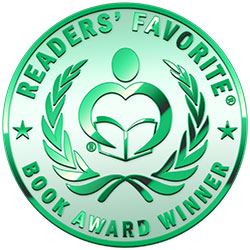
 This author participates in the Readers' Favorite Free Book Program, which is open to all readers and is completely free. The author will provide you with a free copy of their book in exchange for an honest review. You and the author will discuss what sites you will post your review to and what kind of copy of the book you would like to receive (eBook, PDF, Word, paperback, etc.). To begin, click the purple email icon to send this author a private email.
This author participates in the Readers' Favorite Free Book Program, which is open to all readers and is completely free. The author will provide you with a free copy of their book in exchange for an honest review. You and the author will discuss what sites you will post your review to and what kind of copy of the book you would like to receive (eBook, PDF, Word, paperback, etc.). To begin, click the purple email icon to send this author a private email.
![]() This author participates in the Readers' Favorite Book Donation Program, which was created to help nonprofit and charitable organizations (schools, libraries, convalescent homes, soldier donation programs, etc.) by providing them with free books and to help authors garner more exposure for their work. This author is willing to donate free copies of their book in exchange for reviews (if circumstances allow) and the knowledge that their book is being read and enjoyed. To begin, click the purple email icon to send this author a private email. Be sure to tell the author who you are, what organization you are with, how many books you need, how they will be used, and the number of reviews, if any, you would be able to provide.
This author participates in the Readers' Favorite Book Donation Program, which was created to help nonprofit and charitable organizations (schools, libraries, convalescent homes, soldier donation programs, etc.) by providing them with free books and to help authors garner more exposure for their work. This author is willing to donate free copies of their book in exchange for reviews (if circumstances allow) and the knowledge that their book is being read and enjoyed. To begin, click the purple email icon to send this author a private email. Be sure to tell the author who you are, what organization you are with, how many books you need, how they will be used, and the number of reviews, if any, you would be able to provide.

Reviewed by Vincent Dublado for Readers' Favorite
Children of Alpheios by Diana Fedorak raises thought-provoking questions about genetics. Welcome to Alpheios, a genetically engineered colony. Like most mothers, twenty-one-year-old Alina had her baby, Mandin, at Genodyne, a pristine and heavily protected building impervious to the storms. However, Genodyne’s lab tests found a genetic anomaly in Mandin that draws the interest of the colony’s central corporation. It appears this mutation came from Alina’s father and remained undetected, as Genodyne did not initially search for it. In Mandin, the mutation has moved to a new level. As her protective maternal instinct kicks in, Alina will do anything to protect her baby and, in the process, keep the children of Alpheios safe.
The preciousness of human life and its preservation are overarching themes in Children of Alpheios. It also shows that evolution must be allowed to take its course without artificial intervention, as humans must continue to develop to meet the demands of changing environments. Diana Fedorak’s tale has the potential to pose profound scientific and philosophical questions about medical ethics and humanity’s future. It may be highly speculative, but it is serious storytelling with valid arguments, well-placed in a character-driven plot. Children of Alpheios gives you a compelling reason to read it because you are treating yourself to a well-written story that adequately explores the gift of being human and what we can do to embrace our humanity.